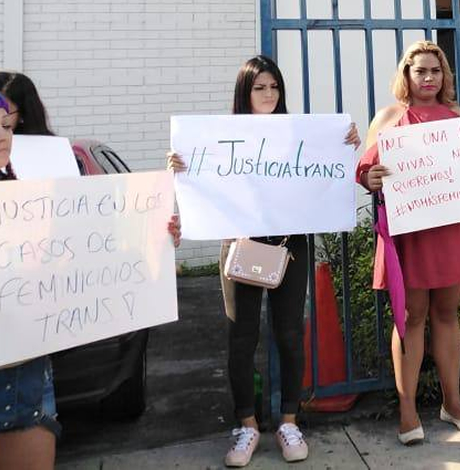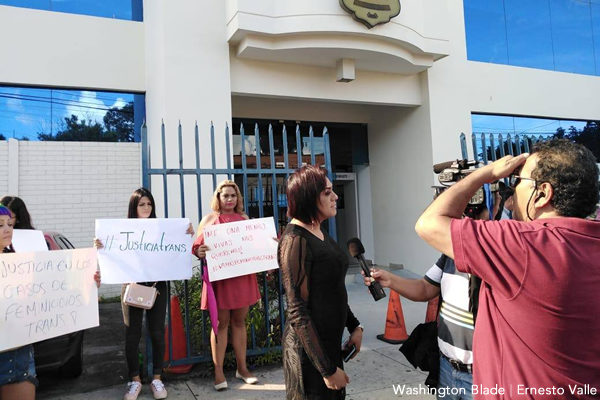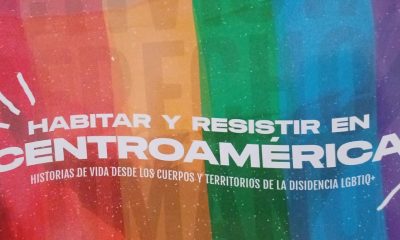News
Población LGBTQ de El Salvador denuncia impunidad ante crímenes por odio
Anahy Rivas, una mujer trans, fue asesinada en San Salvador el 27 de octubre


SAN SALVADOR, El Salvador — La Federación Salvadoreña de Personas Lesbianas, Gays, Bisexuales, Trans e Intersexuales (FESLGBTI), que aglutina a 12 organizaciones LGBTQ del país, realizó el día jueves 31 de octubre del presente año, una conferencia de prensa para dar a conocer su posicionamiento ante la impunidad por los crímenes por odio que han acontecido en los últimos meses.
Entre los casos que se mencionaron están el de Jorge Castillo, el 11 de enero de 2019 que fue asesinado con once disparos en el rostro en el departamento de San Miguel; Camila Díaz, mujer trans privada de libertad por agentes de la policía, recibió múltiples golpes y luego falleció el 31 de enero de 2019; además el caso de “Lolita” asesinada a machetazos en Sonsonate el 8 de febrero de 2019; sin olvidar el caso de “Tity” mujer trans que fue asesinada a golpes en avenida Cuscatlán el 10 de marzo de 2019 y por supuesto el reciente caso de Anahy Rivas que sujetos en una camioneta le sujetaron y le arrastraron sobre el bulevar Los Héroes y luego lesionaron con arma blanca el pasado 27 de octubre del presente.
Desde que se reformó el código penal en el año 2015 en sus artículos 129 y 155, que tipifica los crímenes por odio si se basan en la orientación sexual, identidad y expresión de género; no se han condenado a culpables por los asesinatos de personas LGBTQ, aunque los hechos sean suficiente evidencia que dichos crímenes fueron motivados por el odio y prejuicio hacía las víctimas.
“El sistema de justicia no tiene contabilizados los crímenes de la población LGBTI, porque solo contabilizan por sexo biológicamente asignado, ya sea hombre o mujer”, comenta en conferencia Mónica Linares, directora ejecutiva de Aspidh Arcoíris Trans. Agregaron que en los últimos tres años (2017, 2018 y 2019), han documentado al menos 20 asesinatos a mujeres trans entre los 16 y 32 años de edad, y estos son los casos de los que se dan cuentan las organizaciones y esto solo afirma el hecho que el promedio de vida de una mujer trans en El Salvador no sobre pasa los 33 años.
“En la fiscalía dicen que hay apertura para realizar protocolos para el trato a casos de personas LGBTI. Dicen tener interés de tocas el tema, pero al momento de ejecutar su trabajo, esto no ocurre, por lo cual hay un doble discurso”, asegura Linares.
Debido a estas situaciones y a la gravedad de los hechos que expusieron en la conferencia de prensa, la FESLGBTI exige a la Fiscalía General de la República (FGR) y a la Policía Nacional Civil (PNC), además de las demás entidades que conforman al sector justicia del país, que investiguen los asesinatos a personas LGBTQ, aplicando la reforma al código penal referida a crímenes por odio y buscar así la condena a los culpables.
En especial exigieron a la FGR la pronta aprobación y divulgación con el personal de la fiscalía de una “política de persecución penal y su respectivo protocolo de investigación, de delitos cometidos en contra de la población LGBTI”; pues consideran que es algo impostergable la puesta en marcha de acciones institucionales encaminadas a terminar con la impunidad en los casos de crímenes fundados en el odio y prejuicio en contra de la población LGBTQ.
“Estamos a cuatro días de la evaluación de El Salvador en el examen periódico universal. La CIDH hizo recomendaciones al Estado salvadoreño y ofreció ayuda a través de la Dirección de Diversidad Sexual, la cual está extinta por la nueva administración”, comentaba Bianca Rodríguez, directora ejecutiva de la organización COMCAVIS TRANS.
“Hacemos el llamado a los tres órganos del Estado, responder a estos crímenes por odio, ya no queremos más impunidad, queremos justicias”, agrega Rodríguez.
La FESLGBTI reitera que no permitirán que los crímenes contra la población LGBTQ queden en el anonimato y en silencio por más tiempo; además que no permitirán más vulneración al derecho a la salud, educación, seguridad, trabajo y a la vida digna libre de estigmas y discriminación.
Plantón frente a Fiscalía General de la República.
Un día antes de la conferencia de prensa, diferentes organizaciones como Fundación Somos Familia y Aspidh Arcoíris Trans, se reunieron frente a la FGR para pedir justicia en los crímenes contra la población LGBTQ.
Portando carteles con diferentes consignas, las diferentes personas asistentes mostraron su descontento por la falta de acción de dicha entidad, en el esclarecimiento de los diferentes casos que existen. Linares dio lectura a un comunicado en el que las organizaciones presentes, exigían a la FGR el esclarecimiento de los casos de crímenes por odio.
“Hay una terrible impunidad ante los crímenes LGBTI. Está el caso de Camila Díaz, que al parecer la madre está recibiendo llamadas de familiares de los tres policía detenidos, tratando de intimidarla, tratando de negociar con ella para que los hombres salgan”, comentó al Washington Blade Linares; “había un testigo criteriado que es una mujer policía quien en la primera audiencia reconoció a los tres policías capturados y ahora en la siguiente audiencia solo reconoció a uno que era quien conducía la patrulla y no a los dos que le iban golpeando atrás”.
Linares externó que al parecer ya existe alteración en el único caso que un juez ha dictaminado como crimen por odio, lo cual le hace dudar el resultado del mismo. Al finalizar la protesta fuera las instalaciones de la FGR en avenida la Sultana, Antiguo Cuscatlán, un grupo encabezado por Linares, entregaron en recepción el comunicado al que se le dio lectura, saliendo de las instalaciones con la decisión de seguir la lucha por que se haga justicia por las compañeras y compañeros que han fallecido hasta la fecha.
District of Columbia
Judge rescinds order against activist in Capital Pride lawsuit
Darren Pasha accused of stalking organization staff, board members, volunteers

A D.C. Superior Court judge on Feb.18 agreed to rescind his earlier ruling declaring local gay activist Darren Pasha in default for failing to attend a virtual court hearing regarding an anti-stalking lawsuit brought against him by the Capital Pride Alliance, the group that organizes D.C.’s annual Pride events.
The Capital Pride lawsuit, initially filed on Oct. 27, 2025, accuses Pasha of engaging in a year-long “course of conduct” of “harassment, intimidation, threats, manipulation, and coercive behavior” targeting Capital Pride staff, board members, and volunteers.
In his own court filings without retaining an attorney, Pasha has strongly denied the stalking related allegations against him, saying “no credible or admissible evidence has been provided” to show he engaged in any wrongdoing.
Judge Robert D. Okum nevertheless on Feb. 6 approved a temporary stay-away order requiring Pasha to stay at least 100 feet away from Capital Pride’s staff, volunteers, and board members until the time of a follow-up court hearing scheduled for April 17. He reduced the stay-away distance from 200 yards as requested by Capital Pride.
In his two-page order issued on Feb. 18, Okun stated that Pasha explained that he was involved in a scooter accident in which he was injured and his phone was damaged, preventing him from joining the Feb. 6 court hearing.
“Therefore, the court finds there is a good cause for vacating the default,” Okun states in his order.
At the time he initially approved the default order at the Feb. 6 hearing that Pasha didn’t attend, Okun scheduled an April 17 ex parte proof hearing in which Capital Pride could have requested a ruling in its favor seeking a permanent anti-stalking order against Pasha.
In his Feb. 18 ruling rescinding the default order Okun changed the April 17 ex parte proof hearing to an initial scheduling conference hearing in which a decision on the outcome of the case is not likely to happen.
In addition, he agreed to consider Pasha’s call for a jury trial and gave Capital Pride 14 days to contest that request. The Capital Pride lawsuit initially called for a non-jury trial by judge.
One request by Pasha that Okum denied was a call for him to order Capital Pride to stop its staff or volunteers from posting information about the lawsuit on social media. Pasha has said the D.C.-based online blog called DC Homos, which Pasha claims is operated by someone associated with Capital Pride, has been posting articles portraying him in a negative light and subjecting him to highly negative publicity.
“The defendant has not set forth a sufficient basis for the court to restrict the plaintiff’s social media postings, and the court therefore will deny the defendant’s request in his social media praecipe,” Okun states in his order.
A praecipe is a formal written document requesting action by a court.
Pasha called the order a positive development in his favor. He said he plans to file another motion with more information about what he calls the unfair and defamatory reports about him related to the lawsuit by DC Homos, with a call for the judge to reverse his decision not to order Capital Pride to stop social media postings about the lawsuit.
Pasha points to a video interview on the LGBTQ Team Rayceen broadcast, a link to which he sent to the Washington Blade, in which DC Homos operator Jose Romero acknowledged his association with Capital Pride Alliance.
Capital Pride Executive Director Ryan Bos didn’t immediately respond to a message from the Blade asking whether Romero was a volunteer or employee with Capital Pride.
Pasha also said he believes the latest order has the effect of rescinding the temporary stay away order against him approved by Okun in his earlier ruling, even though Okun makes no mention of the stay away order in his latest ruling. Capital Pride attorney Nick Harrison told the Blade the stay away order “remains in full force and effect.”
Harrison said Capital Pride has no further comment on the lawsuit.
District of Columbia
Trans activists arrested outside HHS headquarters in D.C.
Protesters demonstrated directive against gender-affirming care

Authorities on Tuesday arrested 24 activists outside the U.S. Department of Health and Human Services headquarters in D.C.
The Gender Liberation Movement, a national organization that uses direct action, media engagement, and policy advocacy to defend bodily autonomy and self-determination, organized the protest in which more than 50 activists participated. Organizers said the action was a response to changes in federal policy mandated by Executive Order 14187, titled “Protecting Children from Chemical and Surgical Mutilation.”
The order directs federal agencies and programs to work toward “significantly limiting youth access to gender-affirming care nationwide,” according to KFF, a nonpartisan, nonprofit organization that provides independent, fact-based information on national health issues. The executive order also includes claims about gender-affirming care and transgender youth that critics have described as misinformation.
Members of ACT UP NY and ACT UP Pittsburgh also participated in the demonstration, which took place on the final day of the public comment period for proposed federal rules that would restrict access to gender-affirming care.
Demonstrators blocked the building’s main entrance, holding a banner reading “HANDS OFF OUR ‘MONES,” while chanting, “HHS—RFK—TRANS YOUTH ARE NO DEBATE” and “NO HATE—NO FEAR—TRANS YOUTH ARE WELCOME HERE.”
“We want trans youth and their loving families to know that we see them, we cherish them, and we won’t let these attacks go on without a fight,” said GLM co-founder Raquel Willis. “We also want all Americans to understand that Trump, RFK, and their HHS won’t stop at trying to block care for trans youth — they’re coming for trans adults, for those who need treatment from insulin to SSRIs, and all those already failed by a broken health insurance system.”
“It is shameful and intentional that this administration is pitting communities against one another by weaponizing Medicaid funding to strip care from trans youth. This has nothing to do with protecting health and everything to do with political distraction,” added GLM co-founder Eliel Cruz. “They are targeting young people to deflect from their failure to deliver for working families across the country. Instead of restricting care, we should be expanding it. Healthcare is a human right, and it must be accessible to every person — without cost or exception.”

Despite HHS’s efforts to restrict gender-affirming care for trans youth, major medical associations — including the American Medical Association, the American Academy of Pediatrics, and the Endocrine Society — continue to regard such care as evidence-based treatment. Gender-affirming care can include psychotherapy, social support, and, when clinically appropriate, puberty blockers and hormone therapy.
The protest comes amid broader shifts in access to care nationwide.
NYU Langone Health recently announced it will stop providing transition-related medical care to minors and will no longer accept new patients into its Transgender Youth Health Program following President Donald Trump’s January 2025 executive order targeting trans healthcare.
Ecuador
Justicia reconoce delito de odio en caso de bullying en Instituto Nacional Mejía de Ecuador
Johana B se suicidó el 11 de abril de 2023

A casi tres años del suicidio de Johana B., quien estudió en el Instituto Nacional Mejía, colegio emblemático de Quito, el Tribunal de la Corte Nacional de Justicia ratificó la condena para el alumno responsable del acoso escolar que la llevó a quitarse la vida.
Según información de la Fiscalía, el fallo de última instancia deja en firme la condena de cuatro años de internamiento en un centro para adolescentes infractores, en una audiencia de casación pedida por la defensa del agresor, tres meses antes de que prescriba el caso.
Con la sentencia, este caso es uno de los primeros en el país en reconocer actos de odio por violencia de género, delito tipificado en el artículo 177 del Código Orgánico Penal Integral (COIP).
El suicidio de Johana B. ocurrió el 11 abril de 2023 y fue consecuencia del acoso escolar por estereotipos de género que enfrentó la estudiante por parte de su agresor, quien constantemente la insultaba y agredía por su forma de vestir, llevar el cabello corto o practicar actividades que hace años se consideraban exclusivamente para hombres, como ser mando de la Banda de Paz en el Instituto Nacional Mejía.
Desde la muerte de Johana, su familia buscaba justicia. Su padre, José, en una entrevista concedida a edición cientonce para la investigación periodística Los suicidios que quedan en el clóset a causa de la omisión estatal afirmó que su hija era acosada por su compañero y otres estudiantes con apodos como “marimacha”, lo que también fue corroborado en los testimonios recogidos por la Unidad de Justicia Juvenil No. 4 de la Fiscalía.
Los resultados de la autopsia psicológica y del examen antropológico realizados tras la muerte de Johana confirmaron las versiones de sus compañeras y docentes: que su agresor la acosó de manera sistemática durante dos años. Los empujones, jalones de cabello o burlas, incluso por su situación económica, eran constantes en el aula de clase.
La violencia que recibió Johana escaló cuando su compañero le dio un codazo en la espalda ocasionándole una lesión que le imposibilitó caminar y asistir a clases.
Días después del hecho, la adolescente se quitó la vida en su casa, tras escuchar que la madre del agresor se negó a pagar la mitad del valor de una tomografía para determinar la lesión en su espalda, tal como lo había acordado previamente con sus padres y frente al personal del DECE (Departamento de Consejería Estudiantil del colegio), según versiones de su familia y la Fiscalía.
#AFONDO | Johana se suicidó el 11 de abril de 2023, tras ser víctima de acoso escolar por no cumplir con estereotipos femeninos 😢.
Dos semanas antes, uno de sus compañeros le dio un codazo en la espalda, ocasionándole una lesión que le imposibilitó caminar 🧵 pic.twitter.com/bXKUs9YYOm
— EdicionCientonce (@EdCientonce) September 3, 2025
“Era una chica linda, fuerte, alegre. Siempre nos llevamos muy bien, hemos compartido todo. Nos dejó muchos recuerdos y todos nos sentimos tristes; siempre estamos pensando en ella. Es un vacío tan grande aquí, en este lugar”, expresó José a Edición Cientonce el año pasado.
Para la fiscal del caso y de la Unidad de Justicia Juvenil de la Fiscalía, Martha Reino, el suicidio de la adolescente fue un agravante que se contempló durante la audiencia de juzgamiento de marzo de 2024, según explicó a este medio el año pasado. Desde entonces, la familia del agresor presentó un recurso de casación en la Corte Nacional de Justicia, que provocó la dilatación del proceso.
En el fallo de última instancia, el Tribunal también dispuso que el agresor pague $3.000 a la familia de Johana B. como reparación integral. Además, el adolescente deberá recibir medidas socioeducativas, de acuerdo al artículo 385 del Código Orgánico de la Niñez y Adolescencia, señala la Fiscalía.
El caso de Johana también destapó las omisiones y negligencias del personal del DECE y docentes del Instituto Nacional Mejía. En la etapa de instrucción fiscal se comprobó que no se aplicaron los protocolos respectivos para proteger a la víctima.
De hecho, la Fiscalía conoció el caso a raíz de la denuncia que presentó su padre, José, y no por el DECE, aseguró la fiscal el año pasado a Edición Cientonce.
Pese a estas omisiones presentadas en el proceso, el fallo de última instancia sólo ratificó la condena para el estudiante.
-

 Baltimore5 days ago
Baltimore5 days ago‘Heated Rivalry’ fandom exposes LGBTQ divide in Baltimore
-

 Real Estate5 days ago
Real Estate5 days agoHome is where the heart is
-

 District of Columbia5 days ago
District of Columbia5 days agoDeon Jones speaks about D.C. Department of Corrections bias lawsuit settlement
-

 European Union5 days ago
European Union5 days agoEuropean Parliament resolution backs ‘full recognition of trans women as women’




















